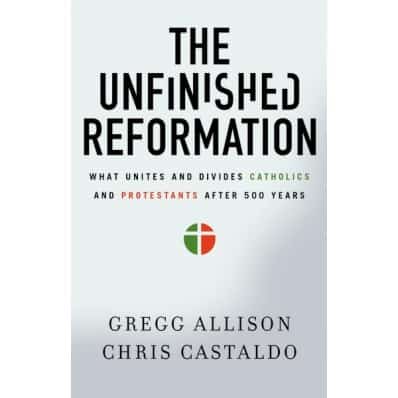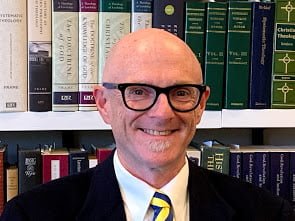⏱️ Estimated Reading Time: 3 min read
The book market is beginning to see a rise of titles that deal with the Protestant Reformation as we move closer to the 500th anniversary of Luther’s bold move at Wittenberg. Gregg Allison and Chris Castaldo collaborate on a creative work that poses a critical question: “What unites and divides Catholics and Protestants after 500 years?” The authors are clear about the core of this controversy: “To whom did God give authority to define Christian faith? Did it belong to the institution of the Roman Catholic Church? Or was Scripture its own interpreter?” These questions serve as a sort of litmus test which will eventually help readers discover the truth.
Before discussing the most essential differences between the two traditions, The Unfinished Reformation helps readers understand that there is, in fact, much that is shared in common. For instance, there is essential agreement on the Trinity, the nature and revelation of God, the person and work of Christ, and the Holy Spirit, among other things.
But there are several distinct differences between Roman Catholics and Protestants; differences that have caused a serious rift between the two traditions. These differences are sharp and have prompted much debate throughout church history. The fundamental matters of authority and salvation are the key drivers which have led to severe disagreements between Catholics and Evangelicals. A brief summary of these differences includes the role of Scripture and tradition, the Roman Catholic belief of purgatory, prayer for the dead, penance, Mary’s role in the Christian life, and the role of the sacraments.
The difference that carries the most weight and theological controversy is Rome’s repudiation of justification by faith alone. The authors present the view of justification which was rediscovered by the Reformers and contrast it with the view that Rome embraced during the days of the Reformation; a view that is still maintained to this day. Allison and Castaldo state:
Unlike Catholic theology, in which the decisive verdict of God’s acceptance comes at the end of life following the accumulation of sacramental grace and merits, Protestants emphasize the decisive moment when people believe in the gospel apart from works. They are justified by faith alone, and their perfect standing before God results in new life as children of God, a life that then blossoms with virtuous fruit by the internal renewal of the Holy Spirit through the Word of God.
Allison and Castaldo conclude that the Reformation is finished in some respects. The historical accomplishment of the Reformation is undeniable and have charted a specific trajectory that will never be altered.
But more importantly, the authors note that the Reformation is still not complete. Theological differences remain intact: “From our perspective, unless the Catholic Church undergoes radical reform according to Scripture, the Reformation will necessarily continue.”
The Unfinished Reformation is a much-needed book as we move closer to the 500th anniversary of the original Protest. Both Roman Catholics and Protestants will benefit from Allison and Castaldo’s work. Their research is meticulous and they present their findings with grace and humility. My hope is this work will receive a wide readership and that the labors of the Reformers will carry on and lives will be enriched and transformed by the gospel of Jesus.
I received this book free from the publisher. I was not required to write a positive review.




